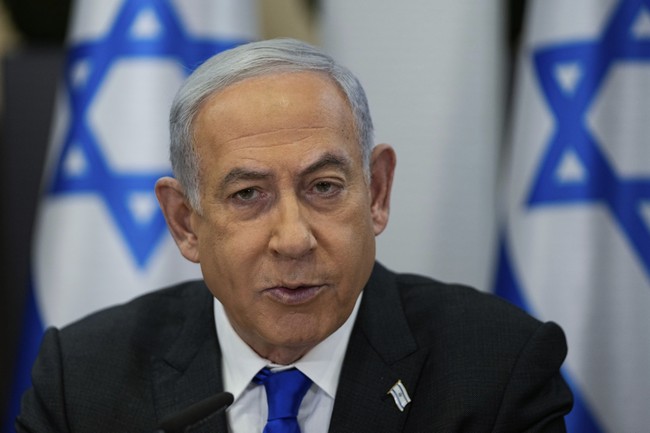We support our Publishers and Content Creators. You can view this story on their website by CLICKING HERE.

Hezbollah — or what’s left of it — sued for peace. Hamas — or what’s left of it — will shortly blink out of existence if it doesn’t do the same. Bsshar al-Assad has fled the region, and with it Iran’s last connections to two of its three proxy terror groups in the region.
Advertisement
That leaves the Houthis in Yemen, who have the same sense of impeccable timing as their fellow terrorists. Just as Israel began consolidating its positions on their borders with Syria and Lebanon and considered what to do about the Houthis, the Yemen group lobbed two ballistic missiles at Tel Aviv. And that prompted the kind of response from Israel that they wanted to deliver all along:
Israel Air Force (IAF) fighter jets struck Houthi terror targets in the capital of Sana’a in Yemen during the early hours of Thursday morning, as 14 aircraft were already in the air as Yemen fired a ballistic missile towards Israel, the military announced.
The IDF added that the targets Israel struck were used by the Houthis for military purposes, which included smuggling Iranian weapons into the country. The IDF also confirmed that ports and energy infrastructure in Sana’a were hit during the strikes.
This time, the Israelis had more ambitions than just a demonstration of capabilities. They targeted all three ports used by the Houthis for weapons transfers as well as commercial traffic, and began hitting command locations in the captured capital for the first time:
Israeli military sources said the strikes in Yemen were aimed at paralyzing all three ports used by the Iran-backed Houthis on the coast of the country.
All of the tugboats used to bring ships into ports were struck in the Israeli attack, as were power stations.
In Israel’s previous attack on the Hodeida port, the cranes used to unload shipments were struck.
Israel now believes that all activity at the ports controlled by the Houthis is paralyzed, sources said.
Advertisement
Iran has apparently not gotten the message that they have lost their wider war, not even after Israel’s defeat of Hezbollah cost them their Assad puppet in Damascus. The IDF made that explicitly clear after the strikes in Sana’a and in Hodeidah:
⭕️ IAF fighter jets struck military targets belonging to the Houthi terrorist regime on the western coast and in inland Yemen.
Over the past year, the Houthi terrorist regime has been operating with the direction and funding of Iran, and in cooperation with Iraqi militias in… pic.twitter.com/hYNRstbhxP
— Israel Defense Forces (@IDF) December 19, 2024
Benjamin Netanyahu followed up by warning the Houthis and everyone else that the Israelis are done with symmetric responses. He also emphasized that the Israelis are not the only target of Iranian proxy terror attacks, but that Israel will be happy to deliver enough of an asymmetric response on behalf of all:
Hours after the Israel Defense Forces carried out intense airstrikes against Houthi targets in Yemen, Prime Minister Benjamin Netanyahu said Thursday that Israel’s operations are protecting not just itself from the Iran-backed rebel group but the entire world.
“They are not only attacking us,” Netanyahu said in a video statement. “They are attacking the entire world. They are attacking international shipping and trade routes.” …
“When Israel acts against the Houthis, it acts for the entire international community,” Netanyahu said, adding that the US and many others “understand this well.”
He suggested that the rebel group was among the last Iranian proxies still active “after Hamas, Hezbollah and the Assad regime in Syria.”
The Houthis, he said, “are learning and they will learn the hard way that anyone who attacks Israel pays a very heavy price.”
Advertisement
The Houthis responded today by declaring that they will continue attacking Israel while hostilities continue in Gaza. If they believe that their long-range attacks will deflect Israel from their determination to destroy Hamas, they really should look at the massive changes in the region over the last four months. Hezbollah had the exact same ambition, and they were both better prepared and much better positioned to take on Israel in service to a “unified battleground” on behalf of their Iranian masters. Instead, Israel utterly destroyed them and with them the last remaining strut holding up Assad.
However, the conflict in Gaza may come to an end soon anyway, or at least pause for a significant period of time. Netanyahu called a security cabinet meeting to discuss developments in negotiations with Hamas, which might signal a deal is getting closer to fruition:
Prime Minister Benjamin Netanyahu was set to hold a high-level meeting on Thursday with top security officials as efforts to reach a hostage-ceasefire deal with Hamas appeared to gather momentum, Israeli televion reported Wednesday.
Netanyahu’s planned assessment, which will include Defense Minister Israel Katz and Strategic Affairs Minister Ron Dermer, comes as CIA chief William Burns reportedly arrived in Qatar Wednesday night to try and hammer out the outstanding issues. Channel 12 news said that if there was progress, senior Israeli officials would join the talks.
And in a sign of the approaching endgame, Netanyahu has reduced the number of people involved in the negotiating efforts and instructed them not to share any details about the talks, the network said, noting the insistence was out of concern that far-right members of his coalition could step up pressure to torpedo the deal as it nears.
Advertisement
If so, then perhaps what’s left of Hamas has more sense than the Houthis. Or maybe this will give the Houthis a face-saving way to back down and preserve at least one Iranian proxy for a little while longer.

 Conservative
Conservative  Search
Search Trending
Trending Current News
Current News 







